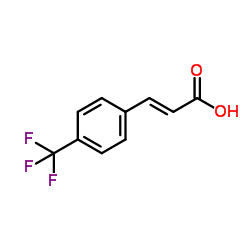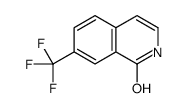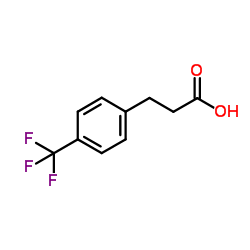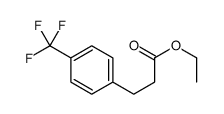trans-4-(Trifluoromethyl)cinnamic acid
Modify Date: 2024-01-02 19:38:53

trans-4-(Trifluoromethyl)cinnamic acid structure
|
Common Name | trans-4-(Trifluoromethyl)cinnamic acid | ||
|---|---|---|---|---|
| CAS Number | 16642-92-5 | Molecular Weight | 216.157 | |
| Density | 1.4±0.1 g/cm3 | Boiling Point | 279.2±35.0 °C at 760 mmHg | |
| Molecular Formula | C10H7F3O2 | Melting Point | 231-233 °C(lit.) | |
| MSDS | Chinese USA | Flash Point | 122.6±25.9 °C | |
| Symbol |

GHS07 |
Signal Word | Warning | |
| Name | 4-(Trifluoromethyl)cinnamic acid |
|---|---|
| Synonym | More Synonyms |
| Density | 1.4±0.1 g/cm3 |
|---|---|
| Boiling Point | 279.2±35.0 °C at 760 mmHg |
| Melting Point | 231-233 °C(lit.) |
| Molecular Formula | C10H7F3O2 |
| Molecular Weight | 216.157 |
| Flash Point | 122.6±25.9 °C |
| Exact Mass | 216.039810 |
| PSA | 37.30000 |
| LogP | 3.37 |
| Vapour Pressure | 0.0±0.6 mmHg at 25°C |
| Index of Refraction | 1.526 |
Synonym:None Section 2 - COMPOSITION, INFORMATION ON INGREDIENTS
Risk Phrases: 36/37/38 Section 3 - HAZARDS IDENTIFICATION EMERGENCY OVERVIEW
Irritating to eyes, respiratory system and skin. Potential Health Effects Eye: Causes eye irritation. Skin: Causes skin irritation. Ingestion: May cause gastrointestinal irritation with nausea, vomiting and diarrhea. Inhalation: Causes respiratory tract irritation. Causes irritation of mucous membrane. Chronic: No information found. Section 4 - FIRST AID MEASURES Eyes: Immediately flush eyes with plenty of water for at least 15 minutes, occasionally lifting the upper and lower eyelids. Get medical aid. Skin: Get medical aid. Flush skin with plenty of water for at least 15 minutes while removing contaminated clothing and shoes. Wash clothing before reuse. Ingestion: Never give anything by mouth to an unconscious person. Get medical aid. Do NOT induce vomiting. If conscious and alert, rinse mouth and drink 2-4 cupfuls of milk or water. Inhalation: Remove from exposure and move to fresh air immediately. If not breathing, give artificial respiration. If breathing is difficult, give oxygen. Get medical aid. Notes to Physician: Treat symptomatically and supportively. Antidote: None reported. Section 5 - FIRE FIGHTING MEASURES General Information: As in any fire, wear a self-contained breathing apparatus in pressure-demand, MSHA/NIOSH (approved or equivalent), and full protective gear. During a fire, irritating and highly toxic gases may be generated by thermal decomposition or combustion. Extinguishing Media: Use water spray, dry chemical, carbon dioxide, or appropriate foam. Section 6 - ACCIDENTAL RELEASE MEASURES General Information: Use proper personal protective equipment as indicated in Section 8. Spills/Leaks: Clean up spills immediately, observing precautions in the Protective Equipment section. Sweep up or absorb material, then place into a suitable clean, dry, closed container for disposal. Avoid generating dusty conditions. Provide ventilation. Section 7 - HANDLING and STORAGE Handling: Minimize dust generation and accumulation. Avoid contact with eyes, skin, and clothing. Keep container tightly closed. Avoid ingestion and inhalation. Use with adequate ventilation. Wash clothing before reuse. Storage: Store in a tightly closed container. Store in a cool, dry, well-ventilated area away from incompatible substances. Section 8 - EXPOSURE CONTROLS, PERSONAL PROTECTION Engineering Controls: Facilities storing or utilizing this material should be equipped with an eyewash facility and a safety shower. Use adequate ventilation to keep airborne concentrations low. Exposure Limits CAS# 16642-92-5: Personal Protective Equipment Eyes: Wear appropriate protective eyeglasses or chemical safety goggles as described by OSHA's eye and face protection regulations in 29 CFR 1910.133 or European Standard EN166. Skin: Wear appropriate protective gloves to prevent skin exposure. Clothing: Wear appropriate protective clothing to prevent skin exposure. Respirators: A respiratory protection program that meets OSHA's 29 CFR 1910.134 and ANSI Z88.2 requirements or European Standard EN 149 must be followed whenever workplace conditions warrant respirator use. Section 9 - PHYSICAL AND CHEMICAL PROPERTIES Physical State: Solid Color: white Odor: Not available. pH: Not available. Vapor Pressure: Not available. Viscosity: Not available. Boiling Point: Not available. Freezing/Melting Point: 231 - 233 deg C Autoignition Temperature: Not available. Flash Point: Not available. Explosion Limits, lower: Not available. Explosion Limits, upper: Not available. Decomposition Temperature: Solubility in water: Specific Gravity/Density: Molecular Formula: C10H7F3O2 Molecular Weight: 216.16 Section 10 - STABILITY AND REACTIVITY Chemical Stability: Stable at room temperature in closed containers under normal storage and handling conditions. Conditions to Avoid: Incompatible materials, dust generation, excess heat. Incompatibilities with Other Materials: Oxidizing agents, reducing agents, bases. Hazardous Decomposition Products: Carbon monoxide, carbon dioxide, hydrogen fluoride gas. Hazardous Polymerization: Has not been reported Section 11 - TOXICOLOGICAL INFORMATION RTECS#: CAS# 16642-92-5 unlisted. LD50/LC50: Not available. Carcinogenicity: trans-4-(trifluoromethyl)cinnamic acid - Not listed by ACGIH, IARC, or NTP. Section 12 - ECOLOGICAL INFORMATION Other No information available. Section 13 - DISPOSAL CONSIDERATIONS Dispose of in a manner consistent with federal, state, and local regulations. Section 14 - TRANSPORT INFORMATION IATA Not regulated as a hazardous material. IMO Not regulated as a hazardous material. RID/ADR Not regulated as a hazardous material. Section 15 - REGULATORY INFORMATION European/International Regulations European Labeling in Accordance with EC Directives Hazard Symbols: XI Risk Phrases: R 36/37/38 Irritating to eyes, respiratory system and skin. Safety Phrases: S 26 In case of contact with eyes, rinse immediately with plenty of water and seek medical advice. S 37/39 Wear suitable gloves and eye/face protection. WGK (Water Danger/Protection) CAS# 16642-92-5: No information available. Canada None of the chemicals in this product are listed on the DSL/NDSL list. CAS# 16642-92-5 is not listed on Canada's Ingredient Disclosure List. US FEDERAL TSCA CAS# 16642-92-5 is not listed on the TSCA inventory. It is for research and development use only. SECTION 16 - ADDITIONAL INFORMATION N/A |
| Symbol |

GHS07 |
|---|---|
| Signal Word | Warning |
| Hazard Statements | H315-H319-H335 |
| Precautionary Statements | P261-P305 + P351 + P338 |
| Personal Protective Equipment | dust mask type N95 (US);Eyeshields;Gloves |
| Hazard Codes | Xi: Irritant; |
| Risk Phrases | R36/37/38 |
| Safety Phrases | S26-S37/39 |
| RIDADR | NONH for all modes of transport |
| WGK Germany | 3 |
| HS Code | 2916399090 |
| HS Code | 2916399090 |
|---|---|
| Summary | 2916399090 other aromatic monocarboxylic acids, their anhydrides, halides, peroxides, peroxyacids and their derivatives VAT:17.0% Tax rebate rate:9.0% Supervision conditions:none MFN tariff:6.5% General tariff:30.0% |
|
Investigation of the influence of CYP1A2 and CYP2C19 genetic polymorphism on 2-Cyano-3-hydroxy-N-[4-(trifluoromethyl)phenyl]-2-butenamide (A77 1726) pharmacokinetics in leflunomide-treated patients with rheumatoid arthritis.
Drug Metab. Dispos. 37(10) , 2061-8, (2009) Leflunomide is a disease-modifying antirheumatic drug used for the treatment of rheumatoid arthritis (RA). Cytochromes P450, mainly CYP1A2 and CYP2C19, may be involved in the transformation of lefluno... |
| PTF-CNA |
| QV1U1R DXFFF &&trans or E Form |
| 4-Trifluoromethylcinnamic |
| trans-4-(Trifluoromethyl)cinnamic Acid |
| 2-Propenoic acid, 3-[4-(trifluoromethyl)phenyl]-, (2E)- |
| (2E)-3-[4-(Trifluoromethyl)phenyl]-2-propenoic acid |
| (2E)-3-[4-(trifluoromethyl)phenyl]acrylic acid |
| 4-(Trifluoromethyl)cinnamic Acid |
| MFCD00002696 |
| RARECHEM BK HW 0019 |
 CAS#:410086-28-1
CAS#:410086-28-1 CAS#:53473-36-2
CAS#:53473-36-2![3-[4-(Trifluoromethyl)phenyl]-1-propanamine structure](https://image.chemsrc.com/caspic/186/101488-60-2.png) CAS#:101488-60-2
CAS#:101488-60-2![3-[4-(trifluoromethyl)phenyl]prop-2-enoyl chloride structure](https://image.chemsrc.com/caspic/439/120681-07-4.png) CAS#:120681-07-4
CAS#:120681-07-4 CAS#:82989-27-3
CAS#:82989-27-3
